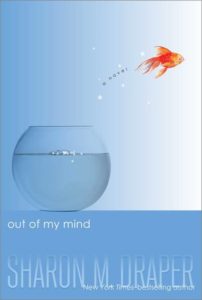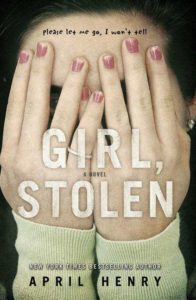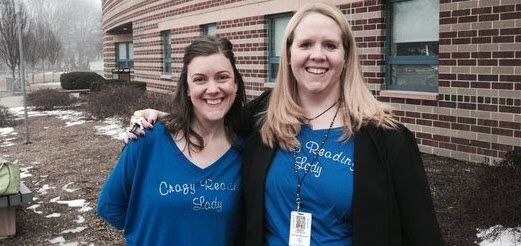Part 1: How “The Crazy Reading Ladies” turned Horace Mann Middle School into the school that reads. This blog is part one of a three-part series.
The expectations of middle school are daunting enough without the added challenges for students with learning disabilities. Students who have difficulty with reading find themselves at a disadvantage that has repercussions academically and socially.
Fortunately, Horace Mann Middle School in Franklin, Massachusetts, has Erin O’Leary and Mary Cotillo, affectionately known by their students as “The Crazy Reading Ladies.” Erin is a reading specialist who provides intensive reading instruction in both pull-out and inclusion classes. Her students’ abilities range from below grade-level performance in reading fluency and comprehension to significantly impaired decoding or processing deficits.
Mary is the assistant principal and a former 8th grade ELA teacher who teamed up with Erin several years ago. They found themselves in each other’s classrooms daily, brainstorming ideas, crafting lessons, and talking about kids and books. Their friendship has since developed into a highly successful partnership, focused on putting good books in the hands of students and building a community of readers and literacy.
In this blog, and the two that follow, Erin and Mary share their wildly successful tips, techniques, and philosophy on removing barriers to reading and getting reluctant students to succeed. This interview has been edited for length and clarity.
What advice can you offer to teachers who serve students with learning disabilities?
Erin: Many of our students have a negative association with reading because someone, somewhere, made them believe they weren’t good at it. These kids are  nothing short of traumatized. We’ve coined the term Post-Traumatic Reading Disorder, and it is a very real thing. Teachers who serve students with learning disabilities see this every day in the kid who says he “hates reading” or that he’s “bad at it.” They see it in the child who hops out of her seat to use the bathroom when silent reading time comes around.
nothing short of traumatized. We’ve coined the term Post-Traumatic Reading Disorder, and it is a very real thing. Teachers who serve students with learning disabilities see this every day in the kid who says he “hates reading” or that he’s “bad at it.” They see it in the child who hops out of her seat to use the bathroom when silent reading time comes around.
How do you heal the traumatic relationship with books? Bring good books into their lives. Read aloud. Use audiobooks. Reading simply has to be the expectation. We won’t tell students what to read, but we tell them reading isn’t optional. Students have a lot of excuses, and we have to be patient. We have to create positive experiences and believe for them until they believe in themselves.
How do you incorporate assistive technology (AT) into your reading program?
Mary: Over the years, we’ve tried a lot: tablets, laptops, apps, extensions, you name it. AT is thrown around as an effective means of supporting students, but it’s often messy and complicated. Although various options exist, educators will tell you they aren’t always as easy as they appear. It has to work, and it has to be close to effortless. We joke, “If it’s not as easy as Netflix, our kids won’t use it.” This is where the simple features of Bookshare and Capti Voice have won our kids over and been our biggest successes.
Some people say that audiobooks hinder a child’s ability to improve reading skills. What are your thoughts on this?
Mary: How do you become a better swimmer? You swim. How do you get better at free throws? Shoot lots of free throws. Same goes for reading. It’s easy to get caught up in the next-best reading program, but the best way to improve students’ reading (and writing) abilities is to let them read. This is where Bookshare comes in. By providing audio support, Bookshare alleviates the decoding task so students can focus on visualizing, connecting, and keeping track of what’s going on in the story. Then their confidence increases because they’ve understood and been able to talk about it in class. Once they’ve got a few books under their belt, some of those kids are right up at grade level.
Can you share a success story of a student who regained confidence in reading?
Erin: Aidan, an 8th grade boy, was very frustrated with reading. He was afraid he wasn’t good at it, so he chose to hate it. He had not developed an attention span for reading and would spend his time staring at a single page or looking around the classroom. I suggested he try Bookshare. Although initially wary, he agreed to give it a shot. He recently finished April Henry’s Girl, Stolen. Finishing and understanding a book was such an accomplishment for him. That one win is the start to rebuilding his confidence.
Next up in Part 2:
- How students use AT to personalize their reading experience

- The social benefits of cultivating a community of readers
- More student success stories
About The Crazy Reading Ladies
In a stroke of serendipity only fans of fine literature can imagine, Erin O’Leary and Mary Cotillo met while teaching together at Horace Mann Middle School in Franklin, Massachusetts. It was there they earned both a reputation and title: “The Crazy Reading Ladies.” This reading specialist and ELA teacher-turned-administrator stop at nothing to motivate adolescents to read and leave them wanting more. Their school-wide reading initiative, All In!™ is currently in its seventh iteration and has been implemented in schools in Massachusetts, Oklahoma, and Florida. In 2017 they authored the YA version of Battle of the Books for Random House Publishing, Co. Previously, they’ve “put to work” books by Una LaMarche, Ellen Hopkins, Jack Gantos, and Ruta Sepetys. Their energetic and engaging style makes them sought-after presenters at local and international conferences. They provide professional development at the school and district levels. Contact them at 2crazyreadingladies@gmail.com for options and availability. Follow their trials and triumphs at crazyreadingladies.blogspot.com and on Twitter and Instagram.


I am confused. How did students who dont have visial impairments get access? From what I can gather it’s terrifically difficult to get access to book share. And Capti costs a great deal if money if you want to use a chik’d voice. I paid 13$ for one voice for my student. How did a while school get access? Could someone explain?
Keri: Any U.S. student who has a visual, learning, or physical disability that prevents him/her from reading traditional printed books qualifies for a free Bookshare membership with proof of disability. This requirement is based entirely on an exemption to U.S. copyright law. (List of qualifying disabilities: https://www.bookshare.org/cms/bookshare-me/who-qualifies) The students at Horace Mann Middle School who are using Bookshare have specific learning disabilities like dyslexia that qualify them for Bookshare memberships. The students use CaptiVoice which is a free reading tool for the basic version. Premium voices do cost a fee. Bookshare members can choose from a variety of free and low cost reading tools: https://www.bookshare.org/cms/help-center/reading-tools/mobile. I hope that answers your questions. Let me know if you need additional assistance. – Laura, Bookshare staff
Students with a reading disability can have a free account. Since I have a special education pull out class every student in my RSP class is on an IEP. They all have access.
I use Bookshare every day in my Resource ELA classes. I project the book on the screen and we have read 4 books this year in each class. One thing we have done is “Popcorn” reading, where one volunteer reader reads as long as they choose, then call on someone to take over reading. We have used the auto reader. The students love it even though they sometimes find the auto-matron voice annoying. They love having the page number setting on and laugh every time the reader reads the page number.
Also I watch, as I am scrolling down as the story goes along. The students read as we progress. Every student watch the screen, as we go along.
It is a very positive experience, the students love it, and I love it!
Lisa: thanks for sharing the creative ways you use Bookshare in your resource class. I am glad it is a positive experience for your students. What are the 4 books your class has read this year? –Laura, Bookshare staff
Yes, this year! I have some students who are not in my pull out class but do have a reading disability who have access to Bookshare. I make available any book they come and request. I am a die hard fan of Bookshare.org!
Oh sorry, the reading teacher misread the question! We have read Hank the Cowdog, Further Adventures of Hank the Cowdog, A Long Walk to Water, Esparanza Rising, Seekers by Erin Hunter, and A Snicker of Magic all this year. The 8th graders read Esparanza and the 7th graders read A Snicker of Magic.
Lisa: thank you for the book suggestions. I am going to share some of them on Bookshare Facebook and Twitter.
Wow! Awesome explanations. I think I need to inform our Bookshare rep in the building that other disabilities apply. Does anyone know how Bookshare applies to post-high kids? Like to those who receive services until they are 21? Is there bookshare available for people who age out and want to use the site as adults ( who still have learning disabilities?). Thanks for the great information!
Keri: There is no upper age limit for students. As long as someone is enrolled in continuing education (e.g., college, graduate school, vocational classes, adult ed, professional development, etc.), and they have a qualifying disability, Bookshare is FREE. Once a member is no longer a student, they pay an annual fee for unlimited downloads of books. More info: https://www.bookshare.org/cms/help-center/which-students-qualify-free-subscriptions-underwritten-osep
[…] Part 1, “The Crazy Reading Ladies” describe how they address Post-Traumatic Reading Disorder and heal […]
[…] Part 1, “The Crazy Reading Ladies” describe how they address Post-Traumatic Reading Disorder and heal […]